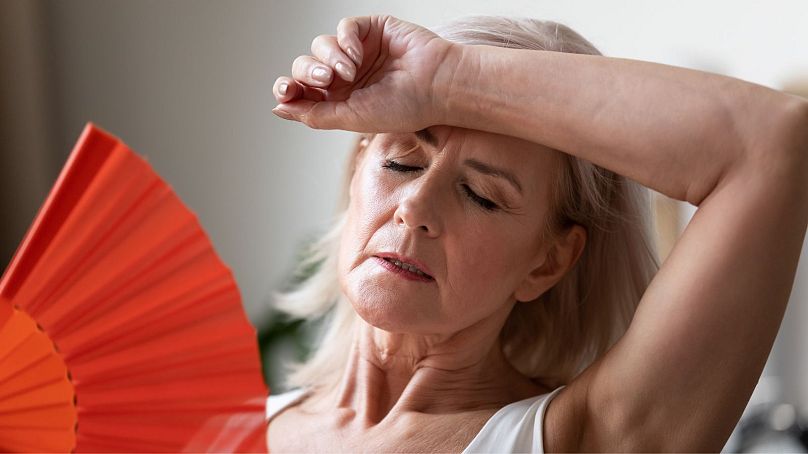Perimenopause: What are the symptoms, and why are women calling it ‘cougar puberty?’

After Amanda turned 42, her body began to feel like a stranger’s. Suddenly plagued with hot flushes, insomnia, and irregular periods, she also noticed herself becoming overly emotional in response to seemingly small, everyday things.
“I assumed it was all related to stress,” the hospital administrator from the US state of Texas told Euronews Health. But even when life calmed down, the symptoms persisted.
“I reached out to my doctor for some blood work, but all my hormones came back normal, so I was told to wait,” added Amanda, who requested that only her first name be used. “Then the cycle would begin again”.
It was only in the last month – a year since she first went to the doctor – that her blood test results showed she has low ovary production. This confirmed what Amanda had been suspecting: her body was in perimenopause.
What is perimenopause?
Menopause marks the end of a woman's reproductive cycle, defined by the absence of a period for 12 consecutive months. On average, women experience menopause between ages 45 and 55, according to the World Health Organization (WHO).
The time leading up to menopause is known as perimenopause, during which hormone levels begin to fluctuate and decline. Symptoms include poor sleep, hot flushes, brain fog, anxiety, mood swings, and irregular periods, the UK’s National Health Service (NHS) states.
“Around one in 30 women under the age of 40 are menopausal, meaning that many young women will also be perimenopausal,” said Dr Louise Newson, a menopause specialist and founder of the Balance app, which provides personalised support for women with menopausal symptoms.
“Factors such as family history, medical conditions, or treatments like surgery or chemotherapy can all lead to menopause occurring at a younger age,” Newson told Euronews Health.
Until recently, perimenopause remained under-discussed due to taboos surrounding the subject, according to Newson. This, along with an absence of any official test to diagnose it, has led some women to feel confused, alone, and belittled by others about their symptoms.
“Many friends would dismiss my concerns that I was menopausal because ‘they’re older and they’re fine,’” Amanda said.
Delays can be serious. Last year, a UK government report found that women suffering from reproductive health conditions, such as endometriosis, frequently wait years for diagnosis or treatment, in one example of what it called “medical misogyny”.
Perimenopause symptoms in particular can have a significant impact on wellbeing, with almost 40 per cent of women experiencing moderate to severe hot flushes and night sweats, according to a study published in the Lancet Diabetes & Endocrinology.
Yet still, it remains significantly under-researched, and many women are misdiagnosed with conditions such as depression, anxiety, arthritis, or fibromyalgia, which causes full body pain and fatigue, according to Newson.
That closely mirrors Amanda’s experience.
“I went to the doctor multiple times, and they always entertained my requests for testing and appointments. But when nothing would show up, and they’d hear about how stressed I’ve been, it was mostly dismissed,” said Amanda.
“I don’t think they were being intentionally dismissive, but ‘stress’ really was used as a general explanation for much longer than it should be”.
How is perimenopause treated?
The main treatment for perimenopause is hormone replacement therapy (HRT), which replaces the body’s declining levels of oestrogen and progesterone, according to the UK’s NHS.
This can be administered via tablets, skin patches, implants, or as a gel or spray for the skin.
Testosterone supplementation can be used as a secondary option in those struggling with fatigue and low libido.
“The type of hormones you need and the doses you’re given vary between each woman – it is not a ‘one type fits all’ prescription,” Newson said.
“Talking through your options with a healthcare professional is really important to ensure you get the right treatment choice for you, depending on your individual circumstances,” she added.
‘Cougar puberty’ and online destigmatisation
As awareness of menopausal symptoms has grown, women have found recognition and solidarity in openly discussing their experiences online.
Last year, a TikTok user shared that she’d just heard “the best term” for perimenopause, coining “cougar puberty”. This humorous rebrand has since gone viral, with others using it to reclaim their experiences and destigmatise the subject.
“Pretty much sums it up, I've been calling it reverse puberty,” reads one TikTok comment. "Cougar puberty... I like the name... try calling ur [sic] hot flashes tropical moments... it sounds like a vacation," said another.
“For too long, perimenopause and menopause were taboo subjects, discussed in whispers or brushed aside as something women simply had to ‘get on with,’” Newson said.
“The visibility and shared experiences we’re now seeing – especially online – are helping to improve conversations and increase knowledge that should have been part of mainstream healthcare for decades”.
Today


